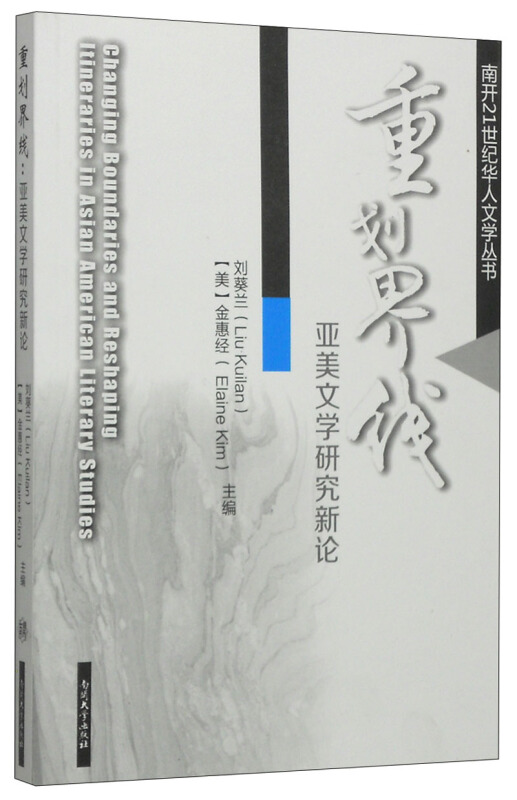- ISBN:9787310046522
- 装帧:一般胶版纸
- 册数:暂无
- 重量:暂无
- 开本:32开
- 页数:281
- 出版时间:2014-11-01
- 条形码:9787310046522 ; 978-7-310-04652-2
内容简介
《重划界线:亚美文学研究新论(英文版)/南开21世纪华人文学丛书》收录了“变换边界与重塑路线:亚美表现文化”国际学术研讨会所汇集的各国学者的优秀论文16篇,主要关注焦点为“跨国主义”与“全球化”,探讨地缘政治使得各种力量不断重新整合、人才与资本大量迁徒流动所引发的对于国界功能及影响的重新理解;论证了如何在美国国界之内或之外定位亚美文学(或亚美研究),亚美研究日渐模糊的界线如何使人重新思考亚裔美国人与亚洲之间的关系,以及该领域的学者与批评家们如何应对民族与跨国体系重组后所带来的理论或方法上的挑战。
目录
Preface
Acknowledgements
Part Ⅰ: Reading Asian American Literature in New Frames
1. Toward a Bifocal View of Chinese American Literature
2. Commentary on Transnational Asian American Studies
Part Ⅱ: Beyond Borders of Nation and Race
3. Asian American Realism and the Literature of Globalization: The Local and the Global in Jhumpa Lahiri and Yiyun Li
4. Where Is Gary Locke in Chinese American Literature? Critiquing Chinese American Literary Transnationalism
5. Amitav Ghosh's Sea of Poppies: Individual Identity and the Imagined Nation
6. Debt, the Shifting Grammar of Life, and Manjula Padmanabhan's Harvest
7. "The Jammed": Representational Politics and Racialized Narratives of the Trafficked Asian Diaspora
8. Re-presenting the Global Filipino: The Story and Songs of Apl de Ap
9. Orientalism, Genre, and Transnational Korean/American
Part Ⅲ: Memories of War/Wars of Memory
10. On the Edges of Consciousness: Figuring Time in Joy Kogawa's Obasan
11. Border-Crossing in the World Republic of Letters: South Korean and Korean American Rearguard Fictions of the Korean War
12. Writing in the Dark: Memory, Memoirs and Re-Membering After Genocide
Part Ⅳ: Ideas of Home and Family
13. Memories Without Borders, Borders Without Memories
14. A Foreigner at Home: The Politics of Home in Francie Lin's The Foreigner
15. Family: The Site of Repression, Resistance, Empowerment, and Formation of Female Subjecthood
16. Transgenerational Trauma in Fae Myenne Ng's Bone
Notes on Contributors
Index
节选
Many young Asian American literary and cultural studies scholars have been moving away from privileging the struggles of U.S. racial minorities for national belonging to a critique of war and empire, from the war against indigenous American Indians to the conquest of Mexico, Puerto Rico, Cuba, Hawaii, Guam, and the Philippines at the turn of the last century, to the imperialist wars in East, Southeast, and West Asia right up to today. They are interested in how concepts like transnationalism and diaspora might decenter the nation and emphasize trans-Pacific, trans Atlantic, and trans-hemispheric frames of analysis and collectively arrived at visions for knowledge production and socialjustice. At this moment, we are all facing a moment of danger. Advances in communication technology and the increasing global mobility of people and ideas during the past two and a half decades have brought Asia and Asian America closer than ever in some ways. But at the same time, advocates of the commercialization of higher education have come to occupy positions of influence in U.S. universities, which have witnessed an ongoing process reorganization around business principles, such as requirements for financial self-sufficiency, new managerial and accounting regimes, collaborations with industry, recruitment of international students to increase revenue, the likening of students to consumers of services offered by faculty and other entrepreneurial behaviors. While it is still true that American universities are still circumscribed by the national, there is growing global conformity to the legal, econonuc, and cunicular imperatives of the worldwide tendency to commercialize higher education. We are all increasingly forced to produce knowledge as a commodity in the service of the nation-state while experiencing a neoliberal restructuring that is at base the Americanization of knowledge production. So in universities across Asia as well, managing and attending universities are evolving into matters of investment and yield. With the globalization of mental labor and the institutional standardization of global academic rankings has come the obsessive pursuit of "global standards" that are in actuality the implementation of an American model haunted by colonial dynamics in which language politics are cultural colonialism par excellence, with Asian scholars obliged to use citation indexes in English language publications in a global academic publishing system that reinforces the hegemony of theoretical paradigms that dominate Anglophone scholarship. Unbelievably, to be credible on the world stage and to have their work circulated, scholars of Korean studies must conduct research and publish their writing in English. If we call into question as a territorialization of East Asian Studies by U,S,-centered global capital and military political systems, we may see that the U.S. cannot be separated from but is rather integral to all that happens in Asia. Indeed, just as white people were not used to seeing themselves as raced and men used to think only women are gendered, the U.S- is no less an area to study than any other. ……
作者简介
刘葵兰,北京外国语大学英语学院教授。研究方向:美国文学、亚/华裔美国文学;著有《变换的边界:亚裔美国作家和批评家访谈录》等。 金惠经,加州大学伯克利分校族裔研究教授、韩裔美国学者,著有《亚裔美国文学:作品及背景介绍》等。
-

她们
¥16.0¥46.8 -

事已至此先吃饭吧
¥15.9¥55.0 -

中国小说史略
¥11.5¥35.0 -

一间自己的房间
¥14.8¥32.0 -

瓦尔登湖
¥11.1¥39.0 -

我是一只骆驼
¥12.5¥32.0 -

茶,汤和好天气
¥8.6¥28.0 -

我的心曾悲伤七次
¥7.8¥25.0 -

有趣,都藏在无聊的日子里
¥14.5¥45.0 -

读人生这本大书
¥8.8¥26.0 -

一个人生活
¥14.5¥45.0 -

夏日走过山间
¥9.1¥30.0 -

存在的艺术(八品-九品)
¥13.5¥39.0 -

门
¥14.4¥42.0 -

南方周末记者文集-大地孤独闪光
¥13.4¥28.8 -

阅读是一座随身携带的避难所
¥15.8¥39.0 -

像我这样和生活开玩笑的人
¥16.6¥52.0 -

给青年的十二封信
¥6.1¥15.0 -

到山中去
¥9.1¥30.0 -

几多往事成追忆
¥10.6¥32.0
















